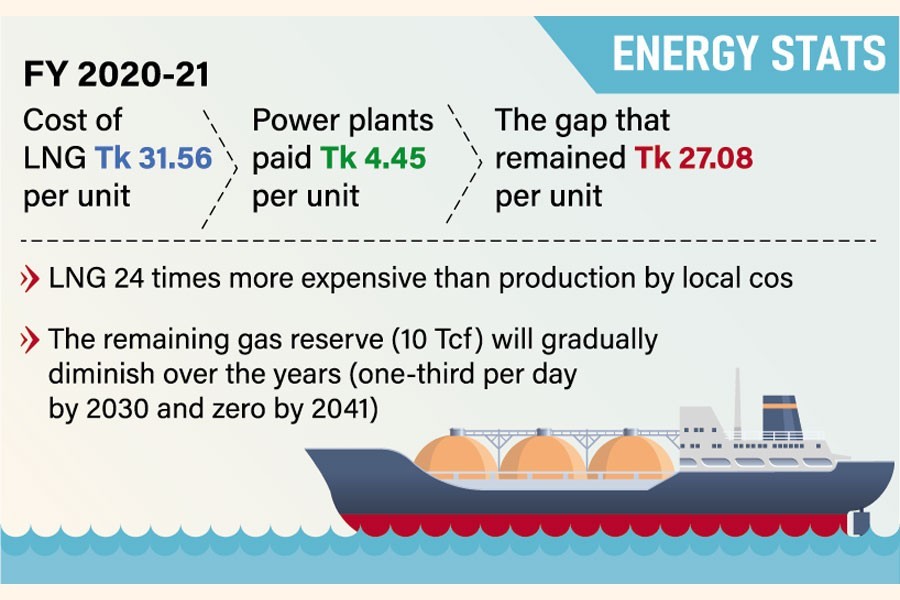Ensuring diversified sources of energy instead of increasing dependence on only particular ones is imperative to keep the economy rolling, eminent experts say, as the government banks on LNG import to adjust gas shortages.
Analysing the findings of a study on the energy front and its economic implications at a dialogue Sunday, they particularly stressed tapping domestic natural gas and coal reserves to cut costly imports.
They stressed expediting exploration activities locally to delineate new hydrocarbon reserves and augment domestic natural gas production to reduce growing dependence on fuel imports.
Centre for Policy Dialogue (CPD) organised the virtual dialogue on 'Gas-LNG Debate in Energy Supply: Costs and Consequences of LNG Import for the Power Sector'.
The price of imported LNG in the fiscal year 2021-22 is going to be 24 times more expensive than the production of natural gas by local companies, says the CPD study.
As per the report, based on available secondary information, government attempt to adjust the shortage of gas by augmenting LNG imports is going to have significant fiscal-budgetary consequences.
The economic cost of LNG in FY 2020-21 was Tk31.56 per cubic meter whereas the power plants only paid Tk4.45 per meter cube, leaving an additional cost burden of Tk27.08 per unit of LNG import, it notes.
In the study report, CPD opines that establishing some 11 new LNG-based power plants having the total electricity-generation capacity of around 6,468 megawatts does not seem logical.
In the short term, LNG imports may need to continue to meet the existing demand-supply gap, but in the medium to long term, Bangladesh needs to consider alternatives to LNG import in the above-mentioned sector with the target of cleaner energy use, it notes.
Prof Badrul Imam of Geology department of Dhaka University opined for local field development by drilling development wells, bringing stranded gas reserves into production, optimizing producing wells, working over the dried-up producing wells and unconventional reserve recovery to meet mounting natural gas demand.
State-run Bangladesh Power Development Board (BPDB) should revisit its existing power-generation plans which are in the pipeline and should not encourage future power plants based on LNG or petroleum, speakers said.
BPDB should not allow using the land available from abandoned coal-fired power plants for establishing LNG-based power plants and Bangladesh Energy Regulatory Commission (BERC) should not consider increasing the gas prices, they added.
Prof M Tamim of Bangladesh University of Engineering and Technology (BUET) viewed that the country should not stop importing LNG in order to keep energy sources widened.
"There is no escape from high price and the policymakers need to be proactive in taking necessary decisions, both economically and politically, keeping the welfare of the general people in concern," he says.
"Local energy is the most secure source of energy," BERC member Mashgul Chowdury told the meet.
Allowing foreign investors to explore the existing resources by allowing multi-client study or survey is also required, he stressed. Energy prices can be fixed seasonally based on market or by formula of the BERC, said top official of Bashundhara LP Gas Jakaria Jalal.
Speakers at the cutting-edge energy discourse also opined that coal extraction from local mines should also be accelerated.
BERC chairman Md Abdul Jalil said that despite hike in energy prices, the government is paying subsidy in the sector. He said the hike in gas prices is expected to be within tolerable level.
He was also critical over 'system loss' (seen as euphemism for pilferage), which is still over 10 per cent.
According to the CPD study, Bangladesh's energy supply has been historically dominated by natural gas although the country's local gas production started declining by the end of the last decade. The remaining gas reserves (10Tcf) will gradually diminish over the years (one- third per day by 2030 and zero by 2041), as per the estimation.
In FY2020-21, gas was 46 per cent of total energy-supply sources as the share of gas-based power plants was reported to be 52 per cent.
According to the projection in the Gas Sector Master Plan of 2017, local supply would be largely unable to meet the local demand and the gap will persist until 2030.
The report reveals that the gap will be the highest in 2023-24 owing to the growing demand rate compared to that of local production.
According to Furlonge (2008), the annual growth rate of LNG was 7.0 per cent, which was much higher than the world energy demand of 1.6 per cent, the CPD study observes.
The LNG-trading market consists of 20 exporting countries and 43 importing economies, as of 2020.
Some 801,240 cubic meters (356.1 million tonnes) of LNG were globally traded in 2020, with a 0.4-per cent growth from the previous year, 40 per cent of which was on a spot or short-term basis.
During the period, most of the total global import (71%) was from Asia with Japan being the largest importer followed by China. Bangladesh, meanwhile, reported being fourteenth on the LNG-import ranking.
Besides, 41 per cent of the LNG volumes were supplied from the Pacific basin, with Australia being the largest exporter followed by Qatar and the USA.
Director-General, Power Cell, Power Division, Ministry of Power, Energy and Mineral Resources (MPEMR) Mohammad Hossain and President of Bangladesh Independent Power Producers' Association (BIPPA) Imran Karim also spoke at the meet.


